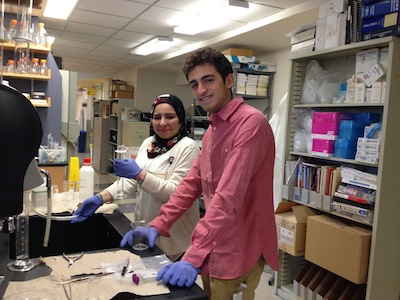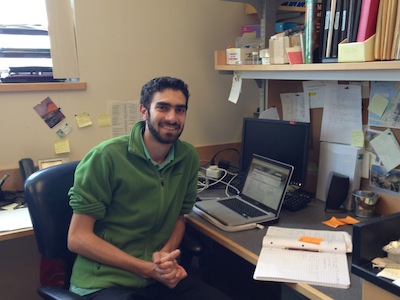Student research relationship blossoms with Harvard Medical School
October, 2014

Student Aya El Jerbi, left, spent the summer studying
neurodegenerative diseases.
The success of WCMC-Q medical students who spent the summer gaining research experience at Massachusetts General Hospital (MGH) in Boston has prompted the creation of a new exchange program between the two colleges.
This summer, Class of 2017 students Aya El-Jerbi, Omar Subei and Joud Abuodeh spent eight weeks working in the research laboratories of the MassGeneral Institute of Neurological Disease (MIND), a division of MGH, which is the largest teaching hospital of Harvard Medical School.
The placement of the students at MGH is the result of an emerging relationship between WCMC-Q and the hospital, which began in the summer of 2013 when Class of 2016 student Mostafa Naguib undertook a summer of research in the MIND institute.
Dr. Nayef Mazloum, assistant research professor of microbiology and immunology, serves as the Coordinator of Student Research and oversees the placement of medical students at external research institutions.
He said: “Mostafa impressed his research mentor at MGH with his dedication, drive and professionalism, and that helped to establish a very positive relationship between WCMC-Q and researchers at MGH.
“After Mostafa’s successful experience, the researchers of the MIND institute were very keen to invite more WCMC-Q students to spend the summer training in the MIND laboratories. This represented a great opportunity for Aya, Omar and Joud to go there this summer and they were also wonderful ambassadors for WCMC-Q.”

Omar Subei worked in the lab of Dr. Bradley T. Hyman where
he helped to investigate Parkinson's disease and
Alzheimer's-related neural system failure.
Aya spent her research experience working in the lab of Dr. Stephen Gomperts studying the hippocampus and the dopamine system of the brain and how their functions degrade in neurodegenerative diseases such as Alzheimer’s and Parkinson’s. Meanwhile, Omar joined the lab of Dr. Bradley T. Hyman where he helped to investigate neural system failure in relation to Alzheimer’s and the role of a specific protein thought to be involved in cause of Parkinson’s disease. Joud worked under the guidance of Dr. Oksana Berezovska on a project that studied the cellular and molecular mechanisms of Alzheimer’s disease using state-of-the-art molecular imaging technologies.
The relationship between the two institutions is now in the process of being formalized as the WCMC-Q/MGH-MIND Research Exchange Program, which will enable medical students who completed their first year to apply for funding to help them spend the summer gaining experience in MIND labs on an on-going annual basis.
The new program has grown out of the success of the WCMC-Q Travel Award Committee, which offers funding assistance on a competitive basis to medical students who submit proposals to undertake research at Cornell campuses and at external institutions. The research projects are student-initiated, meaning the students themselves are responsible for developing working relationships with mentors at other institutions and securing invitations to visit them to work on research projects.
Dr. Mazloum, who chairs the Travel Award Committee, added: “The new program will strengthen the relationship between ourselves and MGH, and will facilitate the exchange process for students who wish to spend their research experience in the MIND labs in Boston, which are conducting some of the most cutting-edge research in the world in the field of neurology, and are run by researchers who are among the very best in their disciplines.
“The program offers our students a great opportunity to discover the world of medicine that exists outside of the college, learn essential research skills and develop their identities as medical professionals.
“As we have seen, the students also serve as excellent ambassadors for WCMC-Q thanks to the energy and enthusiasm they bring to the research projects they join.”
